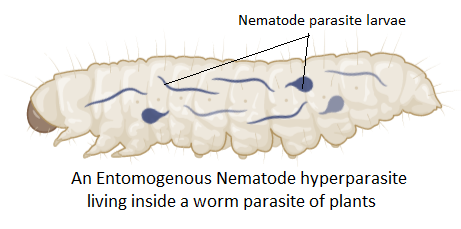
Hyperparasite is a parasite which
A. Kills its host
B. Completes the life cycle in one host
C. Uses host machinery for reproduction
D. None of these
Answer
571.5k+ views
Hint: Parasites are organisms that live dependent on other organisms. They utilize their host’s machinery to synthesize their own products, or they derive nutrition from their hosts, or they reproduce inside their host. In hyperparasitism, the host of the parasite is itself a parasite. Thus, a hyperparasite is the one that is parasitic on another parasite as its host.
Complete answer:
Parasitoids or hyperparasitism is one of the six evolutionary strategies found in parasitism. Parasites are organisms that feed or live on other organisms called the host. They spend their lives at the expense of the host leading to the host’s death. Hyperparasites are those parasites that live or feed on other parasites. Their host is itself a parasite. Mostly the hosts are insects of the order Hymenoptera, Diptera, and Coleoptera. A good example of hyperparasitism can be seen in insects that lay their eggs inside parasitoid larvae that are themselves parasites to the tissue of a host that is usually an insect larva. Pieris rapae or small white butterfly that is a pest of cabbage is also an example of hyperparasitism. Its larvae are host to larvae of wasps. The hyperparasites do not kill the host, they just live in them. Also, hyperparasites have no dependency on the host for completion of their life cycles and they reproduce outside of the host. They just derive their nutrition and find ways to spread by means of a parasitic host.

Hence, the correct answer is option D.
Note: Hyperparasites can directly control their host’s population rate and thus, are used as biological control agents in agriculture. Also, they have applications in medicine. It is thought that most parasitic microbes have hyperparasites that may be useful in agriculture and medicine.
Complete answer:
Parasitoids or hyperparasitism is one of the six evolutionary strategies found in parasitism. Parasites are organisms that feed or live on other organisms called the host. They spend their lives at the expense of the host leading to the host’s death. Hyperparasites are those parasites that live or feed on other parasites. Their host is itself a parasite. Mostly the hosts are insects of the order Hymenoptera, Diptera, and Coleoptera. A good example of hyperparasitism can be seen in insects that lay their eggs inside parasitoid larvae that are themselves parasites to the tissue of a host that is usually an insect larva. Pieris rapae or small white butterfly that is a pest of cabbage is also an example of hyperparasitism. Its larvae are host to larvae of wasps. The hyperparasites do not kill the host, they just live in them. Also, hyperparasites have no dependency on the host for completion of their life cycles and they reproduce outside of the host. They just derive their nutrition and find ways to spread by means of a parasitic host.

Hence, the correct answer is option D.
Note: Hyperparasites can directly control their host’s population rate and thus, are used as biological control agents in agriculture. Also, they have applications in medicine. It is thought that most parasitic microbes have hyperparasites that may be useful in agriculture and medicine.
Recently Updated Pages
Master Class 12 Economics: Engaging Questions & Answers for Success

Master Class 12 Physics: Engaging Questions & Answers for Success

Master Class 12 English: Engaging Questions & Answers for Success

Master Class 12 Social Science: Engaging Questions & Answers for Success

Master Class 12 Maths: Engaging Questions & Answers for Success

Master Class 12 Business Studies: Engaging Questions & Answers for Success

Trending doubts
Which are the Top 10 Largest Countries of the World?

What are the major means of transport Explain each class 12 social science CBSE

Draw a labelled sketch of the human eye class 12 physics CBSE

Why cannot DNA pass through cell membranes class 12 biology CBSE

Differentiate between insitu conservation and exsitu class 12 biology CBSE

Draw a neat and well labeled diagram of TS of ovary class 12 biology CBSE




